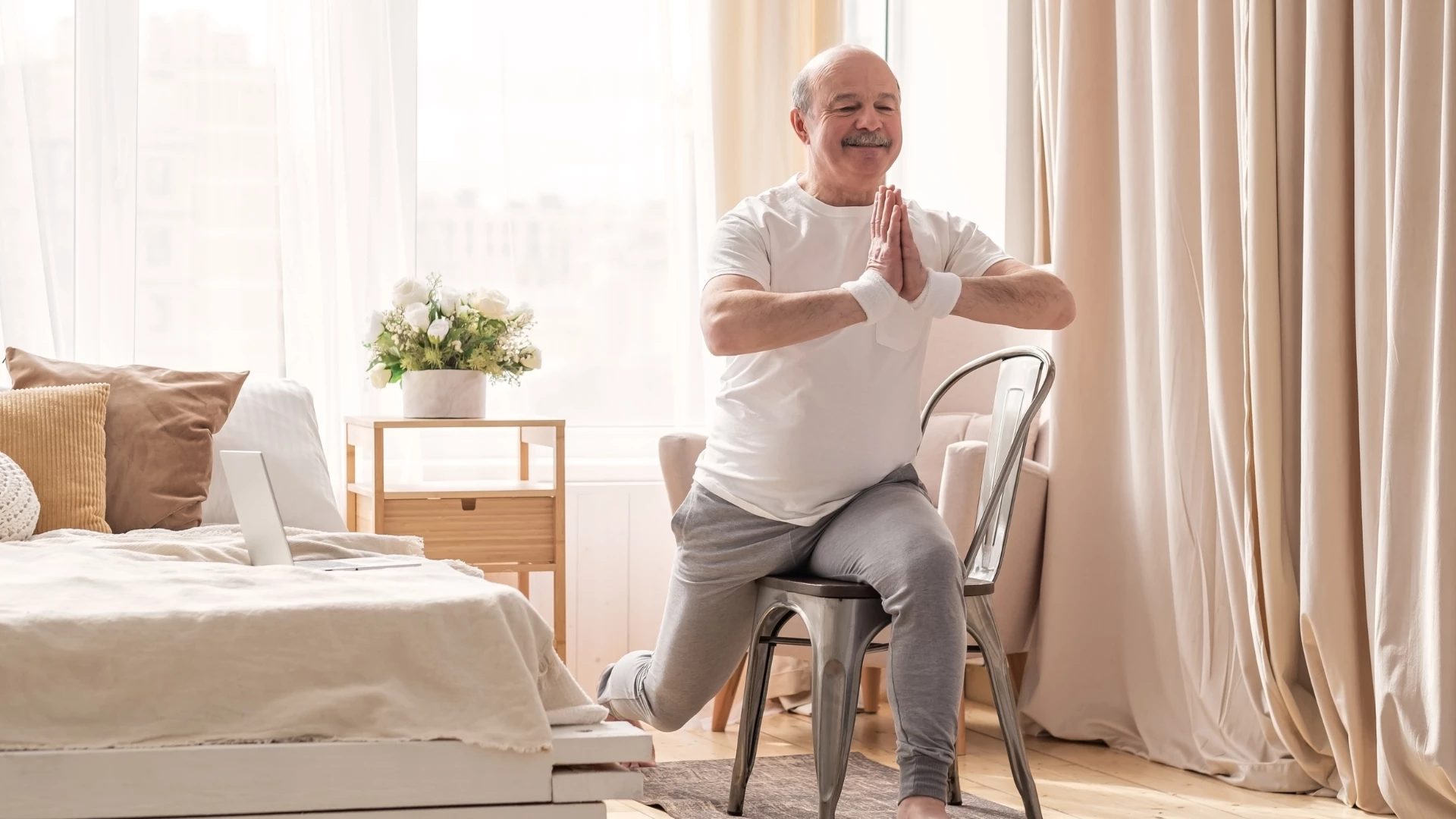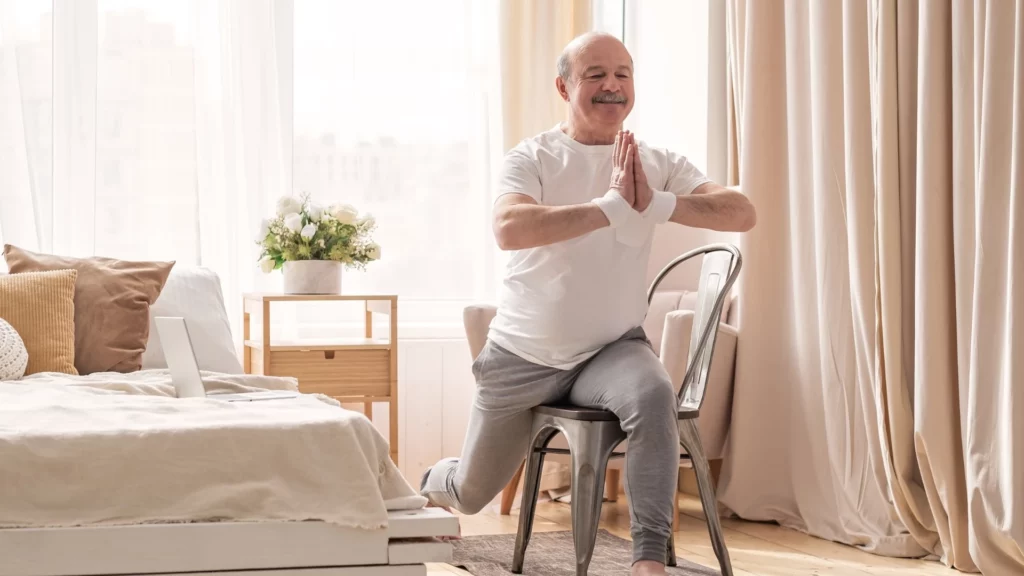Yoga and Brain Health: How Yoga May Help Curb Risk Factors for Dementia

Article At A Glance
While there is no cure, yoga and meditation may help address risk factors for dementia and Alzheimer’s. A yoga practice can also help patients cope with symptoms of memory loss.
Watching the slow decline of someone with dementia or Alzheimer’s is heartbreaking. Unlike a sudden death, you lose the person gradually as their memories fade and their mind becomes confused. As if the loss wasn’t enough, caring for someone with dementia is incredibly stressful and overwhelming.
While there is no cure, meditation and yoga may help dementia patients cope with symptoms and reduce the risk of developing this disease.
What is Dementia?
Dementia is a decline in cognitive functioning beyond the typical effects of aging, affecting a person’s memory, attention, and ability to use language. It is a progressive and irreversible disease, affecting more than 6 million people in the United States. While incredibly common among people 65 and older, dementia is not considered a typical part of aging.
There are many types and causes of dementia, Alzheimer’s being the most common. In fact, Alzheimer’s accounts for about two-thirds of cases in older adults. It is a degenerative brain disease caused by complex changes and cell damage in the brain. Lifestyle changes such as practicing yoga can often help.
Like other forms of dementia, Alzheimer’s affects how people feel, act, and function and their physical health. Symptoms vary from person to person but generally include problems with:
- short-term memory
- communicating thoughts
- impaired visual and spatial abilities
- impaired motor function
- difficulty reasoning
In addition, all forms of dementia impact psychological well-being. Many individuals experience depression, anxiety, agitation, and paranoia. As the disease progresses, symptoms become more severe, including disorientation, confusion, and behavior changes. Eventually, speaking, swallowing, and walking also become difficult.
5 Ways Yoga May Help Prevent Dementia
A regular yoga practice can’t eliminate many of the risk factors for developing dementia, such as age, race, gender, or genetic makeup. It can, however, help you adopt healthy habits, which experts say can lower your risk. Here’s how:
-
Yoga Helps Control High Blood Pressure
Long-term research studies demonstrate that high blood pressure, or hypertension, has harmful effects on the heart, blood vessels, and brain, increasing the risk of stroke and vascular dementia. Yoga provides a set of tools, such as meditation and breathing, which are effective in lowering stress-induced blood pressure.
-
Yoga Helps Reduce Stress and Anxiety

Research indicates that the practice of meditation and yoga can help reduce stress hormones in the body. This is important because stress hormones like cortisol increase inflammation and can negatively impact important brain structures—like the hippocampus—that regulate memory and cognition.
-
Yoga Keeps You Physically and Socially Active
According to experts, regular physical activity is one of the best ways to reduce your risk of dementia. Studies show that physically active people are less likely to experience declines in mental function, lowering their risk of developing Alzheimer’s.
In addition, regular exercise can help combat depression and obesity, both risk factors for Alzheimer’s. Depression, in particular, is known to contribute to memory loss and increased risk of dementia.
Yoga is a great exercise choice, especially as we age, because of its emphasis on flexibility. Yoga also increases balance, an important skill for preventing falls. Attending a group yoga class (even if online) provides an opportunity to both move and stay socially connected.

-
Yoga Helps Us Stay Mentally Engaged
Leisure activities such as reading, playing board games, or crafting keep your brain active, which experts believe helps to ward off dementia. A regular yoga practice can too.
Small changes in memory and thinking, known as mild cognitive impairment (MCI), can occur as we age. While these may not interfere with day-to-day activities, over time, they can worsen, increasing the risk of Alzheimer’s or dementia. Studies show that while engaging in mentally stimulating activities, such as crossword puzzles, can help prevent cognitive decline, practicing yoga and meditation may be just as effective, if not better.
In addition, a growing number of studies point to an increase in positive brain and cognitive changes with yoga and meditation. Learning a new flow of postures or practicing meditation stimulates the brain, helping it form new neural connections and increase neuroplasticity.
-
Yoga Promotes Better Sleep
Studies suggest that sleep patterns, especially in midlife, may contribute to dementia risk. Inadequate sleep has been linked to slower thinking and to abnormal levels of beta-amyloid protein in the brain. These proteins are believed to lead to the development of amyloid plaques typically found in the brains of Alzheimer’s patients. Research shows that regular yoga practice not only can help you get to sleep more easily but can also reduce sleep disturbances.
Can Yoga Help Dementia Patients?
While there is no cure for dementia and Alzheimer’s, research suggests that yoga can play a valuable role in improving symptoms and quality of life for patients and their caregivers by:
- improving memory and reducing cognitive decline
- reducing stress and inflammation
- increasing vagal tone, helping to activate the “rest-and-digest” or parasympathetic nervous system following a stressful response
- increasing circulation, respiration, range of motion, and mobility
- improving body awareness
- improving sleep quality
- enhancing the sense of well-being, self-regulation, and mood

Yoga can also help reduce the risk of falls. In the case of individuals with moderate to severe dementia who may have issues with balance or are unable to sit on the floor or mat, chair yoga provides notable benefits. Several studies of chair yoga for dementia patients found individuals improved both their balance and body awareness. Researchers have also found that meditation, particularly mantra meditation, can be a very effective intervention.
In addition, group yoga classes provide a safe, social, and physical activity that may help alleviate the isolation that Alzheimer’s patients and caregivers often feel. Especially beneficial for caregivers are the stress management tools yoga offers.
Dementia and Alzheimer’s are dreadful diseases. Yoga can help you adopt healthy habits that can reduce your risk. And for those living with these conditions and their caregivers, incorporating yoga and meditation into their care plan has the potential to improve their quality of life and lessen their suffering. And isn’t that what yoga is all about?
Be well!
Also, read...
4 Ways Yoga Impacts the Aging Brain
May 01 – Beverly Davis-Baird, MA, e-RYT200/RYT 500, C-IAYT
Yoga and Body Image: How Yoga Can Help You Make Friends with Your Body
Jun 30 – By: Kimber Simpkins
Smooth Transitions: 9 Ayurvedic Tips for Moving into Spring
May 28 – By: Susanna Barkataki
Related courses
Breath as Medicine: Yogic Breathing for Vital Aging
With Doug Keller
Yoga and Myofascial Release: Releasing Chronic Tension with the Bodymind Ballwork Method
With Ellen Saltonstall
Reprinted with permission from Beverly Davis-Baird/WisdomTreeYoga.

Beverly Davis-Baird, MA, e-RYT200/RYT 500, C-IAYT is a New Jersey-based yoga therapist, writer, and educator. She specializes in making yoga accessible for adults 50+, offering classes and workshops for back care, arthritis, bone health, balance, posture, and healthy aging. An educator at heart with over 20 years of experience as a public school teacher, Beverly brings her knowledge of individual learning styles to her classes, providing instruction that is clear, concise, inclusive, and compassionate. Bringing over 30 years of experience and training, she considers herself a lifelong learner and believes that the practice of yoga should bring spaciousness and release from tension, not create it. As such, she strives to make yoga accessible to people of differing abilities, believing the real benefits of yoga come from what is taken with you outside of class and into your life. To read her blog or learn more about her teaching schedule and latest offerings, please visit www.wisdomtreeyoga.com.
Recent articles
Warrior I Pose: 5 Strengthening Variations
Jul 02 – Bridget Frederick, eRYT 500
4 Ways to Practice Locust Pose
Jun 30 – Baxter Bell, MD, eRYT 500, C-IAYT
Deepening Your Home Yoga Practice: An Interview with Judith Hanson Lasater
Jun 30 – staff writer YogaUOnline
Categories
Upcoming courses
Breath as Medicine: Yogic Breathing for Vital Aging
With Doug Keller
Yoga and Myofascial Release: Releasing Chronic Tension with the Bodymind Ballwork Method
With Ellen Saltonstall
JOIN NOW!
Recent articles
Almost there...
Sorry, we couldn't find anything...
Yoga Practice Tips
Warrior I Pose: 5 Strengthening Variations
Warrior I Pose (Virabhadrasana I) is an excellent pose for strengthening your whole back…
Jul 02 – Bridget Frederick, eRYT 500
Pose Library
4 Ways to Practice Locust Pose
Locust Pose (Salabhasana) is a simple backbend that strengthens the entire back of your…
Jun 30 – Baxter Bell, MD, eRYT 500, C-IAYT
Yoga Practice Tips
Deepening Your Home Yoga Practice: An Interview with Judith Hanson Lasater
In this interview with YogaUOnline, renowned yoga teacher Judith Hanson Lasater speaks about a subject very…
Jun 30 – staff writer YogaUOnline





